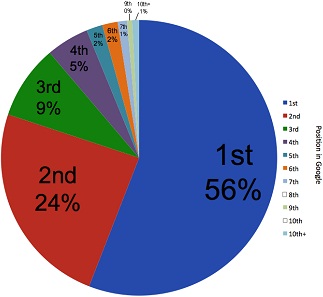 As today is Valentine’s Day, I couldn’t think about a better day to publish this internet love story report. This is of course, the ongoing romance between two of the most popular web brands online, Google and Wikipedia.
As today is Valentine’s Day, I couldn’t think about a better day to publish this internet love story report. This is of course, the ongoing romance between two of the most popular web brands online, Google and Wikipedia.
The “love” is being driven from common shared interests of both sides: While Wikipedia provides Google many high-quality pieces of contents to answer the user’s search queries, Google is the biggest traffic source that feeds Wikipedia and which basically responsible for its enormous popularity.
If you were seeking for some measurable evidences to back up this online virtual passion, a new study that conducted by Intelligent Positioning may provide those findings. The research have taken 1,000 different one-word nouns as Google UK search queries and examined in how many of the results Wikipedia’s pages appears.
The results are showing that Google is deeply, crazy in love with the online encyclopedia: In 99% of the 1,000 searches examined, Wikipedia’s pages appears on the first results page! Additionally, in 96% of the searches Wikipedia’s pages appears in the top five positions! If this isn’t an “algorithmic love”, I don’t know what is…

You can see in the pie above that in no less than 56% of the searches, a Wikipedia page was located in the first position, in 24% it was second and in 9% it was third. Overall, Wikipedia’s pages are located in 89% of the top three positions of the searches examined.
I already heard few bloggers opinion claiming that Google gives too much credit for Wikipedia, but i think this claim is false from its base. Google doesn’t “give” anything! It is us that made (and continue to do so) Wikipedia the traffic monster that it is!
We are the ones who are writing, editing, adding constantly more and more contents every day/hour/minute to Wikipedia to make it as accurate as it possible. We are the ones who links to Wikipedia on a regular basis whenever we too lazy to explain things ourselves want to refer the readers to a valuable information source.
And so, if Google algorithm is reflecting our own behavior even slightly, aren’t WE the ones that are actually in love?